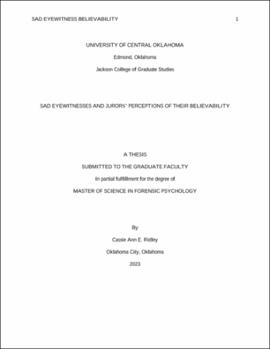| dc.contributor.advisor | Maass, Jaclyn | |
| dc.contributor.author | Ridley, Cassie Ann E. | |
| dc.date.accessioned | 2023-06-26T16:55:03Z | |
| dc.date.available | 2023-06-26T16:55:03Z | |
| dc.date.issued | 2023 | |
| dc.identifier.other | (AlmaMMSId)9982957408002196 | |
| dc.identifier.uri | https://hdl.handle.net/11244/337836 | |
| dc.description.abstract | Eyewitness testimony is heavily relied on in court, and there is a large amount of research on how an eyewitness's and defendant's behavior and emotion can influence a jury's verdict decision. The emotional victim effect occurs when a distressed victim is deemed as more believable, compared to victims that display a calm demeanor with a lack of emotional display. The current study tested three hypotheses. First, this work sought to establish the emotional eyewitness effect, with Hypothesis 1 predicting that an adult non-victim eyewitness would be deemed more believable than an adult eyewitness displaying a neutral emotional demeanor. Secondly, this work tested two possible mechanisms underlying this effect. Hypothesis 2a predicted that the juror's empathy would lead the emotional eyewitness effect, and Hypothesis 2b predicted that the juror's belief in the sad eyewitness would be driven by a misconception that emotional memories are more accurate than neutral memories. Participants watched either a sad or neutral eyewitness give a deposition regarding an attack she witnessed. Participants then rated how much they believed the eyewitness (on a scale of 1 to 5), completed a state empathy measure (Shen's State Empathy Scale), and rated how accurate they felt her memory was. Results indicated that participants believed the eyewitness more when she appeared sad than when she appeared neutral, showing support for Hypothesis 1. Hypothesis 2a was also supported; the emotional eyewitness effect was driven by the participant's state empathy. Hypothesis 2b was not supported; belief that emotional memories are more accurate than neutral ones was not driving the emotional eyewitness effect. However, the participant's belief in the accuracy of the memory did play an independent role in predicting believability. The results of this research have important implications for lawyers, jurors, eyewitnesses, and the general public. Educating the general public of the potential effects of emotional biases on decision-making may help reduce their impact in a court room, but also in everyday life. Future research could examine how other emotions influence empathy and believability, and how this effect translates to a more realistic environment (e.g., a full mock trial or real trial video). | |
| dc.rights | All rights reserved by the author, who has granted UCO Chambers Library the non-exclusive right to share this material in its online repositories. Contact UCO Chambers Library's Digital Initiatives Working Group at diwg@uco.edu for the permission policy on the use, reproduction or distribution of this material. | |
| dc.subject.lcsh | Witnesses | |
| dc.subject.lcsh | Jurors--Attitudes | |
| dc.subject.lcsh | Emotions | |
| dc.subject.lcsh | Truthfulness and falsehood | |
| dc.title | Sad eyewitnesses and jurors' perceptions of their believability | en_US |
| dc.type | Academic theses | |
| dc.contributor.committeeMember | Randell, J. Adam | |
| dc.contributor.committeeMember | Mabry, John | |
| dc.thesis.degree | M.S,, Forensic Psychology | |
| dc.subject.keywords | Emotion | |
| dc.subject.keywords | Emotional display | |
| dc.subject.keywords | Emotional victim effect | |
| dc.subject.keywords | Empathy | |
| dc.subject.keywords | Eyewitness | |
| dc.subject.keywords | Non-victim eyewitness | |
| dc.subject.keywords | Juror | |
| dc.subject.keywords | Memory accuracy | |
| dc.subject.keywords | Forensic psychology | |
| dc.identifier.oclc | (OCoLC)1386274723 | |
| thesis.degree.grantor | Jackson College of Graduate Studies | |
